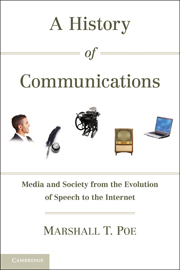5 - Homo Somnians
Humanity in the Age of the Internet
Published online by Cambridge University Press: 05 June 2012
Summary
– Next then, I said…Picture people as dwelling in a cavernous underground chamber, with the entrance opening upward to the light, and a long passageway running down the whole length of the cave. They have been there since childhood, legs and necks fettered so they cannot move: they see only what is in front of them, unable to turn their heads because of the bonds.
– A strange image, he said, and strange prisoners.
– Like ourselves, I replied.
– Plato, The Republic, 514AIn Plato's cave, nobody sees what's really happening. They think they do, but they don’t. Plato says we are like the cave dwellers. We think we see the Truth, but we don’t. The difference is that we can see the Truth if we know how. Plato knew how and wanted to show us. But Plato also knew that we – or at least most of us – are either incapable of or uninterested in coming to grips with the Truth. Philosophers have the way and the will, but the rest of humanity doesn’t. We are quite happy living in our pleasant illusions, far removed from the Truth. This is why we build the imaginary worlds – dramas – that Plato found so disturbing. For what are storytelling, literature, and theater but attempts to escape from reality into some fantasy? The storytellers, writers, and thespians all say we can learn something about ourselves from their productions. But what do we learn, really, if all that is depicted is fiction? Fiction cannot be the Truth, for it is the opposite of the Truth. And even those productions that claim to be something other than fiction – histories and the like – aren't they simply poor reflections of a reality that is gone and cannot be revisited, and therefore really fictions themselves?
Perhaps they are, and perhaps they aren’t. In any case, Plato was on firm ground in asserting that we naturally seek the comfort of illusions. He would not, therefore, be at all surprised by what we have done with the Internet. For there we have created a cave of absolutely immense proportions. In it we see only the reflections of real people and things, the shadows they leave for us to observe on the screens before us. Unlike his prisoners, we are aware that they are there behind the electronic wall. Yet we don't know who or what they “really” are, and we don't much care. It's usually better if we don't know, for that makes the illusion more powerful. All that is important to us is that they provide gratification, that they present a virtual reality that is satisfying to us. Some part of it may not be agreeable, but the cave is so large and its variety so great that we can be certain we will find something diverting, amusing, or even useful in it. Just what that something is will happily remain our own business, because, although there are millions of us in the cave, we are functionally alone. The prisoners in Plato's cave cannot see each other. Neither can we see each other on the Internet, that is, if we don't want to be seen. We are free, therefore, to look where we will without regard for the judgments of others. An added benefit is that we, unlike Plato's shackled captives, can cast our own shadows. This is both enjoyable for us and pleasing to others. Whether our projections are truthful, reasonable, or dignified is largely beside the point. For the point of our virtual world is to entertain and be entertained, and that goal is sometimes best achieved by lies, foolishness, and impropriety. Most important, we believe that none of it matters precisely because we are in the cave and not in real life. We reject absolutely one of Plato's central premises, namely, that playing at acting badly and watching other people play at acting badly will somehow harm us.
- Type
- Chapter
- Information
- A History of CommunicationsMedia and Society from the Evolution of Speech to the Internet, pp. 202 - 250Publisher: Cambridge University PressPrint publication year: 2010



